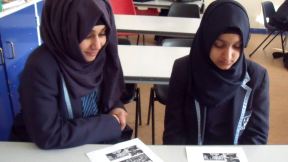
Teaching has always been a difficult profession, regardless of what, where, or how you teach. Imparting knowledge to others is both a burden and a blessing. Throughout my five years of teaching Sunday school, I have come across many challenges, but the overall experience has been a positive one. The next generation is our future and making sure their priorities are correctly balanced is vital to Islam. It is not enough to know the basics principles. It must also be practiced as a routine in our daily lives. It is an excellent thing that kids pray or fast but understanding why is essential to their development. Kids need to recognize the reasoning behind prayer and why we do this. As a result, they will then be connected to Islam more deeply and naturally.
Why should we worry about the importance of Islam? Living in the West we may take for granted the freedoms that we have to practice our religion. Currently, there are several places in the world where it is banned or difficult to be Muslim or practice anything to related to Islam. Therefore, when we have the opportunity to practice our religion freely, we should take this as a blessing. The younger generation is particularly important in this. They will be the ones to continue the legacy and having a strong Muslim identity is key to being a balanced person.
Often, parents can find giving their children the right type of Islamic education difficult but small things done at home can make a lasting, positive, and meaningful impact. The most important reason I enjoy teaching kids is because I believe in shaping young minds in a positive way that brings them closer to God and our religion. I also love the fact the majority of kids are open to learning. Those that do not require extra motivation and especially during the COVID-19 pandemic this can be challenging. Kids can soak up knowledge like a sponge and observe everything. It is important to be mindful of what you say to them.
Making a Connection Is Key
I like being able to connect with kids and hear about their own experiences and stories they want to share. Being an educator is not just about talking down to kids but to listen, observe, and give them a chance to express themselves. Too often in all our culture kids’ views or opinions are not valued or side lined. This is not a healthy practice that should be followed by either parents or educators. However, rules and guidelines in the classroom need to be followed. In particular, I like to give time for students to talk about their day before our lesson begins. I try to make sure each child gets around one minute to speak before they know it’s time to learn. Respect goes a long way in communication and conversation.
With the upcoming school year, it is important to remind ourselves that Islamic education should be given equal priority as secular education. Each type of education serves an important purpose in a child’s growth and development. Secular education provides academic knowledge and life skills that will help a child find their path in the world. Islamic education is what a child needs to build a spiritual connection to Allah (SWT), establish their Muslim identity, and have a blueprint for living their life as a Muslim. A child needs both types of schooling to feed the mind and the soul.
Preparing for a New School Year
Here are some useful tips that I like to recommend to parents/families as the new school year begins.
- Mentally Prepare - This is essential to ensuring that you and your child have a successful school year ahead. As teachers we are constantly thinking of different ways to adapt to situations. Explain to your child why they will be attending Sunday school and its purpose.
- Set Expectations - Talk to your child about the behavior expectations you have as they attend Sunday school. For example, respecting the teacher, participating in lessons/activities, being attentive, kind to peers etc.
- Reinforce Learning Concepts - No matter how busy you are it is important to model practicing Islam. Ask your child to repeat back to you what they have learned or go over some items with them at a later time.
- Set up a Schedule –
- Don't be a helicopter parent - Recognize that your child needs space and time to grow on their own as well. Always be there for them and be ready to answer any questions that they may have but let them come to you with questions.
In conclusion, raising children and managing their education can be a hard process. If you utilize the proper tools, knowledge, and skills you will be able support your child in the best way possible. Do not be afraid to talk to your child’s teacher if you ever feel like you need extra help. Most teachers are willing to work with you if you have concerns. I’d like to close with one of my favorite quotes “It take a whole village to raise a single child” and to raise a Muslim child, a whole community.
Faiza Zainab Khan has been teaching with her local Sunday School for the past five years and takes a keen interest in community development, with a focus on youth and early education.








Add new comment